The Sixth Annual Annapolis Film Festival Showcases Another Strong Lineup
Written by: Christopher Llewellyn Reed | March 30th, 2018
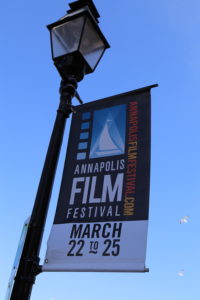 Over four days, beginning March 22 and ending March 25, the 2018 Annapolis Film Festival screened 80+ films, a mix of documentary and narrative, shorts and features. I was only able to watch 8 of the latter (and none of the shorts), four each of both documentaries and narratives. I missed the opening-night movie (Beirut), but was very happy with the films I saw. It’s a great event, which this year launched a new slogan–”Voices Strong. Minds Open”–that reflects the festivals’ mission to promote as wide a variety of work as possible. The city of Annapolis (home to the Naval Academy), itself, is a gorgeous place to visit, affording audiences a chance to break from the screenings with a lovely stroll down to the waterfront, if desired.
Over four days, beginning March 22 and ending March 25, the 2018 Annapolis Film Festival screened 80+ films, a mix of documentary and narrative, shorts and features. I was only able to watch 8 of the latter (and none of the shorts), four each of both documentaries and narratives. I missed the opening-night movie (Beirut), but was very happy with the films I saw. It’s a great event, which this year launched a new slogan–”Voices Strong. Minds Open”–that reflects the festivals’ mission to promote as wide a variety of work as possible. The city of Annapolis (home to the Naval Academy), itself, is a gorgeous place to visit, affording audiences a chance to break from the screenings with a lovely stroll down to the waterfront, if desired.
As I did last year, I offer up capsule reviews of the films I watched, in order of preference, by category. Only one of this year’s award-winners is among them (although the documentary-feature jury-prize winner, Love Means Zero, is a film I saw earlier, at a different fest, and I link to that review, separately). We each make the choices we make, and hope for the best. I am not unhappy with my selections.
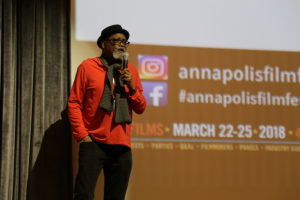
DOCUMENTARIES (I loved all the films I saw in this category almost equally, so my ranking indicates but a mild preference of one over the other)
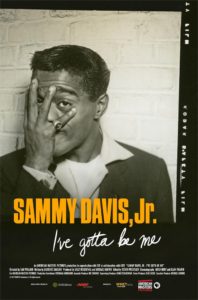
1. Sammy Davis, Jr.: I’ve Gotta Be Me (Sam Pollard, 2018)
Veteran editor and director Sam Pollard (Two Trains Runnin’) offers up a comprehensive, moving portrait of the late, great entertainer Sammy Davis, Jr. (1925-1990), made for PBS’ American Masters series. In it, we discover the man in all his complicated glory, from the early years as a child star to the final moments, on stage, sick with cancer, dancing at a gala in his honor. We learn so much about Davis’ place in 20th-century history, whether in the arena of pop culture or civil rights. We also discover how he lost an eye (in a car accident), and how the hospital recovery led to his conversion to Judaism. Most entertainingly (beyond his preternatural abilities as a tap dancer and singer), we see and hear his marvelous talent as an impressionist, doing incredible sendups of Humphrey Bogart, James Cagney and James Stewart. At the time he did these, originally, in the 1950s, a black performer spoofing white celebrities was unheard of; it’s just one of the many ways he broke down barriers. Similar, but more serious transgressions included his romance with Kim Novak and then marriage to May Britt, both white actresses. And then, we get the famous Rat Pack–Davis, Dean Martin, Frank Sinatra, Peter Lawford and Joey Bishop–where, for a while, the bonhomie between its members helped sell the illusion of American racial harmony. It’s a splendid work of art about a splendid man.
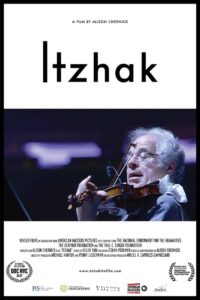
2. Itzhak (Alison Chernick, 2018)
Another PBS American Masters film, Itzhak follows violinist Itzhak Perlman (born 1945) from his origins as a hard-working child prodigy to his current status as iconic master of his craft. Born in Tel Aviv, Israel, Perlman contracted polio at a very young age, subsequently losing mobility in both legs. This visible handicap made early teachers wary of investing too much effort on him, but through the love and devotion of his parents, Perlman blossomed as a musician, until, in 1958, he played on The Ed Sullivan Show, which appearance led to opportunities to study in the United States, and more. Today, world-famous, a loving husband to wife Toby and father of five, he alternates performing with teaching, determined to give back as much as life has given to him. Director Alison Chernick (Matthew Barney: No Restraint), granted what looks like total access to her subject, takes us behind the scenes of his life and work. Alternating between archival footage of Perlman at various stages of his career and the present day, Chernick shows us the great variety of his achievements and outreach. It’s a wonderful film for lovers of Perlman, classical music and good cinema.
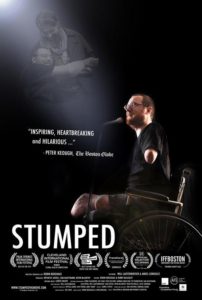
3. Stumped (Robin Berghaus, 2017)
In the fall of 2011, filmmaker Will Lautzenheiser had just taken a teaching job at Montana State University when, on Day 1 of the semester, he began to suffer what felt like cramps in his arms and legs, so he visited the hospital. By Day 2, his body was in septic shock from what turned out to be a Group A Streptococcus infection, and doctors were forced to amputate all four of his limbs to save his life. Director Robin Berghaus’ moving documentary-feature debut chronicles Lautzenheiser’s life since then, which has not been easy, but not without its bright spots. A happy-go-lucky guy, Lautzenheiser takes to doing stand-up comedy, mining his misfortune for laughs, and showing that we need not be undone by calamity. We meet his identical twin brother, his boyfriend, and many more, all of whom form a deeply loving support network. We also get to know the doctors who plan to give Lautzenheiser new arms through relatively new transplant techniques, and meet Richard Mangino, a man who has already gone through such a procedure (and whose forearms, even if a different color than the rest of him, work pretty well). It’s quite the odyssey: joyful, painful and fascinating, all at the same time. Berghaus proves herself more than worthy of her subject, delivering an intimate cinematic portrait that is a stirring testament to his bravery and indomitable spirit.
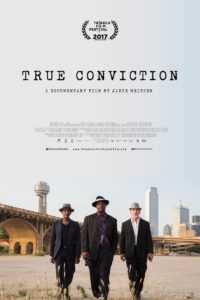
4. True Conviction (Jamie Meltzer, 2017): winner of documentary-feature audience award
Christopher Scott, Johnnie Lindsey and Steven Phillips are three men released from prison after their convictions were vacated, all having served significant spells of 13, 25 and 24 years, respectively. Rather than waste the remainder of their lives on anger and revenge, they have chosen, instead, to form a non-profit organization, House of Renewed Hope, that seeks to exonerate others like them, currently in prison. True Conviction profiles their efforts, chronicling their own personal histories and that of the other men at the center of two cases we follow. They are remarkable individuals, able to transform the horrors they suffered into something positive, though their current lives are not without challenges. Director Jamie Meltzer (Informant) is respectful of his subjects, but allows them to emerge as fully realized human beings, which means they are as flawed as the rest of us, though empowered by the grace that comes from good works. This is strong stuff, raw in its emotional power and brutal in its examination of our frequently broken judicial system.
Two films played at the festival that I had seen elsewhere and previously reviewed: ACORN and the Firestorm and Love Means Zero. I highly recommend both, as well.
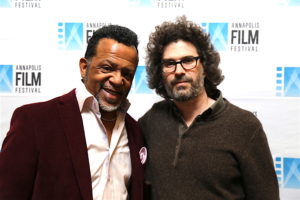
NARRATIVES
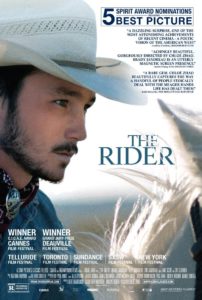
1. The Rider (Chloé Zhao, 2017) [the paragraph, below, is an adaptation of a longer review I wrote for Hammer to Nail, which has yet to post, as of this writing]
A stunning hybrid work of documentary fiction, The Rider (winner of the C.I.C.A.E. Award at the 2017 Cannes Film Festival) follows emotionally and physically broken rodeo riders as they navigate bleak futures made more so by injury and despair. Casting non-actors in roles only loosely adapted from their actual lives, writer/director Chloé Zhao (Songs My Brothers Taught Me) creates a modern-day Western where cowboys and Indians have merged into one, lonely characters adrift in a world that has little use for either. Beautifully photographed on South Dakota’ Pine Ridge Indian Reservation, the film offers the land’s gorgeous vistas as background for its heartbreaking elegy of a time present, yet already gone by. Real-life family members Brady, Lilly and Tim Jandreau star as brother, sister and father (last names changed to Blackburn, though much else remains the same). The film played at this year’s SXSW festival, as well, where I missed it. How grateful I am that Annapolis programmed it, then, for The Rider affected me deeply, its minimalist brilliance a declaration of storytelling principles that makes me want to immediately seek out everything else the director has ever done. One ride was definitely not enough.
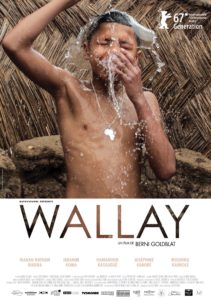
2. Wallay (Berni Goldblat, 2017)
13-year-old Ady, living in France but of Burkinabe origins, takes what he thinks is a short vacation to his father’s hometown, back in Burkina Faso, only to find himself stuck in the middle of a family drama. A thoroughly modern French boy, he can’t adapt to the power outages, lack of hot water and other missing elements of his metropolitan lifestyle, his ubiquitous iPhone his last remaining link to, as he sees it, to civilization. It seems that his domineering uncle, “Tonton Amadou,” is convinced that Ady has been stealing the money orders shipped by his father, and now expects payback. Additionally, Amadou fears that his brother has not raised Ady as a proper Muslim–he’s not even circumcised!–and so takes it upon himself to correct the error. The process does not go well, and soon the older man and the boy are at serious loggerheads. Director Berni Goldblatt (Ceux de la colline) does a fine job making clear the complex relationships between cultures and generations, and creates a a moving tale of personal growth and redemption.
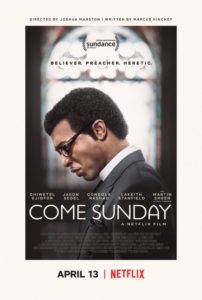
3. Come Sunday (Joshua Marston, 2018)
I had never heard of Bishop Carlton Pearson before watching Come Sunday, a new feature from director Joshua Marston (Complete Unknown), to be released on Netflix on April 13. Then again, I am … gasp … not a religious man, so we can forgive my lack of initial interest in the subject of this movie. Nevertheless, I found the story fascinating, if occasionally inert. Pearson, a popular Pentecostal minister in Tulsa, Oklahoma–and disciple of Oral Roberts–lost both his way and his church in the late 1990s, all for questioning the notion of sin and hell within the Christian scriptures. As one of the few African-American preachers who had as many white as black followers, Pearson sold a vision of interracial harmony before he broke with the idea that anyone who failed to believe in Jesus would be condemned to eternal damnation; an immediate backlash followed. It’s hard, as a viewer, however, not to rally to the cause of universal love, which is supposed to be the cornerstone of Christianity. Marston and his excellent cast–which includes Chiwetel Ejiofor (12 Years a Slave), Jason Segel (Jeff, Who Lives at Home), Condola Rashad (the 2013 version of Steel Magnolias), Lakeith Stanfield (Crown Heights) and Martin Sheen (The Way), among others–do a fine job making what is largely a series of internal struggles quite dramatic. Still, there are odd moments when the film feels like it was made by an Episcopalian (the church of my own childhood) trying vainly to understand evangelicals; there’s a strange emotional restraint that sometimes feels out of character with the proceedings. That notwithstanding, this is otherwise strong filmmaking.
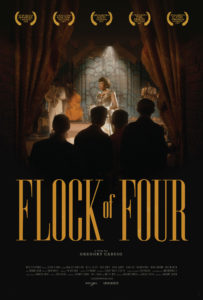
4. Flock of Four (Gregory Caruso, 2017)
Director Gregory Caruso’s narrative-feature debut, Flock of Four follows a quartet of young men, all white, in 1959 Los Angeles, who go in search of a musical idol only to discover their own ignorance of the racial, and racist, history of jazz and its cultural appropriation. Based on a previous 2016 short of the same name, the film can be quite heavy-handed at times, but has some fine moments within that almost make up for the dramatic clumsiness of the other scenes. In particular, the late, great Reg E. Cathey, as Pope Dickson, the famous man pursued throughout the night by the movie’s protagonists, lends his expositional lecture about race a kind of gruff gravitas that lifts it beyond the reductive lessons it imparts. Similarly, the core narrative of why lead character Joey (a fine Braeden Lemasters, Totem) is obsessed with jazz in the first place–a legacy of his deceased father–manages to be quite moving, as well, culminating in a lovely moment where Joey effectively plays piano for dad’s ghost. In addition, I was impressed with Caruso’s pulling off of an effective period piece on a relatively small budget; production design and costuming are solid. Wearing its cinematic heart on its sleeve, Flock of Four may be far from perfect, then, but has enough compelling elements to hold one’s interest throughout.
And that’s it! I hope to be back next year to see at least as many excellent films. I invite one and all to join me!


